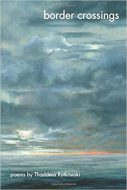 Thaddeus Rutkowski
Thaddeus Rutkowski
Border Crossings
Sensitive Skin Books
Reviewer: Charles Rammelkamp
Thaddeus Rutkowski writes about nature with an implicit reverence, a feeling of awe, that is almost Buddhist in perspective. Take the poem, “The Wild” from his new collection:
Animal tracks in snow—
footloose paw prints—
go across my path,
and vanish into the woods.
Every time I walk outside,
I see this disregard
for human engineering.
These creatures don’t care
about surveying, bulldozing or plowing.
I stick to the tracks
made by boots, tires and cross-country skis.
I deviate only
when I walk into the trees to pee.
Of course, his wit is on full display in the final line, but the message is clear. As hard as human civilization tries to put its stamp on Nature, it never succeeds! Instead, we must live in harmony with our world. This is not so much a stated maxim as a tacit understanding.
In this, Rutkowski’s poems make me think so much of Bashō, the seventeenth century Japanese poet. Nature is something of a shrine. Bashō wrote:
It was with awe
That I beheld
Fresh leaves, green leaves
Bright in the sun.
Rutkowski too writes about the large and small creatures of the outdoors with no less a sense of wonder. In “Leaping Buck Icons,” he contrasts the graceful elegance of deer walking silently through the snow with the anxious kvetching of the residents of the nearby art colony in the woods. In “March Madness,” it is the peepers by a still pond that snag his attention, but
When I reach the spot,
the peepers go quiet,
chirp by chirp.
I sit on a board
decorated with goose guano,
knowing I’m conspicuous
in the amphibious silence.
Rutkowski’s veneration of nature is especially evident when you contrast these poems of simple admiration with the annoyance of city living. Time and again we read about garbage bags in basements, the filth of urban living, sound pollution, and the rest. Take “Siren Song,” a title we would normally associate with seduction and allure. Rutkowski amusingly turns this on its head, a literal siren:
It wouldn’t be a city bike ride
without an ambulance screaming in my ear.
I can try to outrun the rushing wagon,
but a distant wail means it will get closer,
and when it reaches me,
it will sit behind me and shriek.
On most of my bike rides, once isn’t enough.
I’ll hear two or three emergency vehicles
that must pass me, but can’t pass me,
with their sick-person cargo,
so they will whistle
to the center of my brain.
Oy! Contrast that with the peepers at the pond! Rutkowski’s many poems about bugs and birds and the great outdoors are inspiring – “The Crazy Fly,” “Super Nature,” “Yardbirds in Vermont,” “Beetlemania,” “Life of a Bird,” “Brooding Birds,” “Running Bird,” “Bear Sighting” and many more. But the ones about butterflies (“Monarch Migration,” “Butterfly Collector,” “Butterflies and Vultures”) bring Bashō to mind again. Butterflies are a staple in Japanese haiku, after all, along with the cicada.
The contrast between city and country is one of the “borders” Rutkowski crosses again and again in this collection. Another is cultural. Rutkowski is the son of a Polish father and a Chinese mother, and the title poem, indeed, is literally about crossing the border into Hong Kong. It begins a sequence of poems that addresses the feeling of dislocation a traveler often experiences.
The poem, “The Wang Family, 1973,” based on a photograph that is a portrait of his mother’s extended family, effectively evokes this feeling of alienation. The poem concludes:
They’ve gotten together here
in jackets that are almost identical,
designed for a look that’s suitable
under the rule of Chairman Mao.
Another poem, “Harassment,” describes the family home in the United States being pelted with rotten vegetables by local thugs on motorcycles, and one can only infer that the family has been singled out for being “other.” Indeed, that poem is immediately followed by one called “Redneck Admission Test” that begins, “Find a guy with a book, / pull up in your pickup truck, / ask, ‘Where’s the gay bar?’” It ends: “Check your dick / to make sure it’s still attached.”
An amusing poem that not only combines these themes of demographic and cultural borders but also highlights Rutkowski’s subversive wit is one with the newspaper-headline title, “Mistaken as Woodchuck, Wife Shot.”
In a thicket of trees
they become separated,
but they keep walking,
content not to see each other.
Suddenly the husband spots
his wife’s head through the brush,
thinks it looks like the fur
of a woodchuck, and fires.
He’s the kind of guy
who would shoot a cow,
thinking it’s a deer.
But he’s also the kind of guy
who doesn’t want to kill his wife,
so he takes her to a hospital,
where, luckily for him,
she is listed in “stable” condition.
As this poem demonstrates, Rutkowski tells a story in simple, straightforward language – again, much like Bashō. Many of his poems, indeed, read like instructions (See “Redneck Admission Test”). “Mother’s Advice” begins, “Go to the black spring, / bring your lunch / and eat it cold.” It ends: “Go home knowing / you will be a legend / for reaching so deep.” The imperative form of the verb is used in a handful of the poems in Crossing Borders, but the descriptive language throughout the collection is equally simple, accessible, engaging, and vivid.
There is much to say in praise of these poems, from their philosophical bent to their amusing meditative mood, from the modest voice that speaks them to the moral convictions that underpin them. The reader comes away with a distinct satisfaction.

